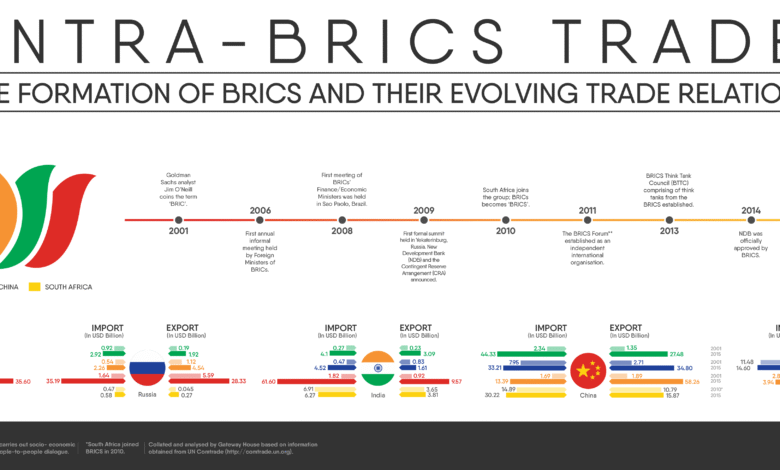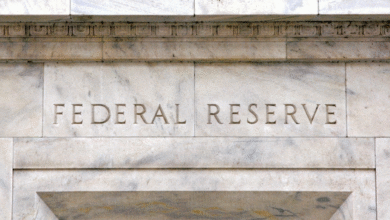BRICS Trade: Brazil Defies Trump Tariff Threats

BRICS trade is at the forefront of a transformative shift in global economics as Brazil leads the charge for a new era of economic independence among its member nations. With bold moves to promote local currency trade and counter the impact of Trump tariffs, Brazil aims to strengthen its ties within the BRICS bloc while minimizing reliance on the U.S. dollar. President Luiz Inácio Lula da Silva’s commitment to dollar-free trade signifies a commitment not only to fair trade practices but also to financial resilience amid international pressures. By advocating for policies that empower BRICS nations through cooperative trade arrangements, Brazil envisions a future where economic sovereignty reigns supreme. This transformation is crucial for the Global South, marking a departure from historical constraints and opening pathways for greater economic collaboration and growth.
The trade dynamics among BRICS nations reflect a significant shift in how emerging economies interact on the global stage, often referred to as collaborative trade practices. Brazil, playing a pivotal role, is championing an economic strategy that emphasizes using local currencies, which reduces dependency on traditional financial mechanisms dominated by Western powers. As countries within the BRICS coalition navigate the complexities of foreign economic policies, particularly in response to international tariff threats, alternative avenues for commerce and cooperation are emerging. This pivot towards a more equitable trade framework highlights the need for economic self-sufficiency, particularly in an era characterized by heightened geopolitical tensions. With an eye towards fostering stronger regional relationships, BRICS trade is becoming a beacon for economic growth and independence among nations seeking to redefine their place in the global economy.
Brazil’s Stance on Dollar-Free Trade within BRICS
In a bold move towards economic independence, Brazil is positioning itself as a leader in dollar-free trade among BRICS nations. This initiative not only reflects Brazil’s commitment to local currency trade but also serves as a strategic maneuver to reduce reliance on the US dollar in international transactions. By advocating for the use of local currencies, Brazil seeks to enhance economic sovereignty and decrease transaction costs, which can ultimately empower other emerging markets within the BRICS framework.
The recent statements from President Lula da Silva underscore the significance of this shift. As Brazil continues to expand its trade partnerships within BRICS, the nation aims to create a system that prioritizes the currencies of member countries over the dominant dollar. This is a crucial step towards fostering greater financial resilience and sustainability for BRICS, as it allows member nations to circumvent potential economic pressures from the US, particularly amidst growing tensions surrounding Trump’s tariffs.
Confronting Trump Tariffs: Brazil’s Economic Strategy
Despite facing threats of significant tariffs from the Trump administration, Brazil remains undeterred in its approach to trade. President Lula’s insistence that threats do not hold weight indicates a broader strategy focused on negotiation rather than compliance. Brazil’s leadership is committed to maintaining its trade policies, which prioritize South-South cooperation and minimize outside influence. This stance highlights Brazil’s role in advocating for fair and equitable international trade practices, particularly for developing nations.
The response to Trump’s tariffs also speaks to the resilience of Brazil’s trade policy. By emphasizing negotiation and cooperation, Brazil is signaling that it will not cower in the face of economic intimidation. This boldness may inspire other nations facing similar pressures, demonstrating the importance of solidarity among emerging economies. With a proactive trade agenda, Brazil is determined to navigate the complexities of global trade while preserving its economic independence.
Brazil is not just reacting to the pressures from the US but is actively redefining its position in the global economic landscape. By spearheading initiatives focused on local currency trade, Brazil aims to create a robust alternative framework for international transactions that can enhance the economic landscape of the Global South.
The idea of local currency trade represents not only economic practicality but also a political statement. It is a rejection of the dollar’s hegemony and an assertion of Brazil’s ability to engage in trade on its own terms. As such, it promotes a united front among BRICS nations, who can collectively push back against the dollar’s dominance in global markets.
Strengthening BRICS’ Economic Independence
Brazil’s leadership within BRICS comes at a pivotal time, as the bloc seeks to strengthen its economic independence. Lula da Silva has articulated a vision for BRICS that prioritizes cooperation over confrontation, embodying the spirit of mutual growth and support among member nations. This is especially critical as BRICS countries represent a substantial portion of the global economy, accounting for nearly 39% of global GDP and housing more than half of the world’s population. By promoting policies that enhance local currency use, BRICS can unlock new avenues for trade and investment.
The push for economic independence within the BRICS framework is fundamentally about rebalancing global economic power. In defiance of external pressures, particularly from the U.S., Brazil and its BRICS partners are exploring innovative financial solutions that could potentially reduce volatility linked to dollar reliance. This collaborative approach not only fosters trust among member states but also positions BRICS as a formidable force in shaping the future of global economic governance.
The Future of Trade in the BRICS Bloc
As the BRICS summit approaches, Brazil’s commitment to reshaping trade policies will be a central topic of discussion. Lula emphasizes that the future of trade within the BRICS bloc will involve collaborative financial strategies that leverage the strengths of its diverse membership. Through diversified trade practices and increased use of local currencies, BRICS countries can work together to reduce vulnerability to external economic shocks and enhance resilience.
Moreover, the prospects of dollar-free trade stand to revolutionize economic interactions among BRICS nations. By establishing a framework that facilitates greater local currency transactions, BRICS members will not only bolster their economic autonomy but also pave the way for more equitable trade relationships. This vision aligns with broader initiatives aimed at fostering sustainable development across the Global South, setting the stage for a more inclusive global economy moving forward.
Promoting Financial Resilience in Emerging Economies
Brazil’s initiative for dollar-free trade not only serves its national interests but also reinforces the broader objectives of emerging economies seeking financial resilience. The commitment to local currency trade allows BRICS countries to reduce their exposure to the fluctuations of the US dollar, enhancing stability in their trade relations. Lula’s vision of economic sovereignty is mirrored in the aspirations of other emerging markets looking to assert their independence from traditional economic power dynamics.
Furthermore, by encouraging a system that minimizes reliance on external currencies, Brazil is setting a precedent that may encourage other nations to follow suit. This could ignite a movement among developing countries to prioritize regional currencies and alternative financial mechanisms, fundamentally shifting trade dynamics on a global scale. Financial resilience is not merely about survival; it is about reimagining the power structures inherent in international trade.
BRICS as a Catalyst for Trade Reform
Brazil’s assertive stance has positioned BRICS as a catalyst for trade reform, inspiring other nations to consider alternative pathways in global trade. The bloc’s emphasis on economic independence and local currency utilization resonates in an era where many countries are seeking to break free from dependence on Western financial systems. By advocating for a multipolar world where trade decisions are made collectively, BRICS offers a compelling model for reform that could reshape global economic norms.
Moreover, as the BRICS nations continue to collaborate on shared trade policies, the collective bargaining power of the bloc will only grow. By pooling resources, knowledge, and strategies, BRICS can promote sustainable and equitable trade practices that prioritize the interests of their populations. This holistic approach could serve as a benchmark for trade reform initiatives worldwide, emphasizing solidarity among emerging economies and fostering a climate that supports mutual growth.
Navigating the New Trade Landscape
The evolving economic climate demands that countries navigate a new trade landscape that prioritizes resilience and adaptability. Brazil’s proactive approach in leading BRICS reflects an understanding of the complexities involved in this environment, especially in light of rising protectionism exemplified by Trump’s tariff threats. Through innovative measures aimed at enhancing economic independence, Brazil is not only safeguarding its interests but also paving the way for a more collaborative future among emerging economies.
As Brazil champions local currency trade, it sets a course for navigating these new challenges effectively. The focus on enhancing local trade mechanisms is critical as it allows nations to respond flexibly to external pressures while fostering deeper economic integration within BRICS. This strategy will not only mitigate risks associated with economic coercion but also build a more resilient framework for trade that prioritizes the needs and aspirations of BRICS member countries.
The Role of Local Currency in Global Trade Reformation
The movement towards local currency trade within BRICS signifies a pivotal moment in the reformation of global trade dynamics. By advocating for a system that values currencies other than the dollar, Brazil and its partners are challenging established norms and fostering an environment where trade can thrive on its own merits. This approach not only diversifies trade practices but also empowers BRICS nations to dictate the terms of their economic engagements.
Enhancing local currency usage can also catalyze a shift towards more equitable trade relationships, as it diminishes the influence of any single currency on global markets. As Lula noted, the historical perception of the Global South is rapidly changing; BRICS nations are no longer seen merely as developing economies but as key players capable of shaping future economic landscapes. With the adoption of local currencies, member nations can transcend mere transactional relationships, instead forging bonds based on shared interests and collaborative growth.
Frequently Asked Questions
How is Brazil’s trade policy influencing BRICS trade amid U.S. tariffs?
Brazil’s trade policy is significantly shaping BRICS trade by promoting the use of local currencies for transactions, reducing dependence on the dollar, and enhancing economic independence among member countries. This strategic shift comes in response to threats of U.S. tariffs, particularly from President Trump, and reflects Brazil’s commitment to forge a resilient economic path within the BRICS bloc.
What is dollar-free trade in the context of BRICS?
Dollar-free trade within BRICS refers to the emerging practice of conducting trade between member nations using their local currencies instead of the U.S. dollar. This approach, championed by Brazil, aims to enhance financial autonomy, reduce transaction costs, and foster economic independence, especially in light of external pressures like Trump tariffs.
How does Brazil plan to achieve economic independence through BRICS trade?
Brazil aims to achieve economic independence through BRICS trade by advocating for local currency transactions and reducing reliance on the U.S. dollar. By doing so, Brazil seeks to enhance financial resilience among BRICS nations, enabling them to operate independently of U.S. economic policies and tariff threats.
What role does Brazil play in BRICS trade initiatives against U.S. tariffs?
As the current president of BRICS, Brazil is at the forefront of trade initiatives that challenge U.S. tariffs. President Lula has publicly denounced Trump’s threats, emphasizing Brazil’s dedication to promoting local currency trade and the bloc’s unified response to external economic pressure, which reinforces BRICS’ stance as a strong economic entity.
What strategies are being employed by BRICS to promote local currency trade?
BRICS is employing strategies such as bilateral agreements, financial cooperation, and the establishment of alternative payment systems to promote local currency trade. These efforts aim to minimize reliance on the U.S. dollar and facilitate smoother trade transactions among member countries, ultimately bolstering their economic independence.
How does the current BRICS summit aim to address global trade challenges?
The upcoming BRICS summit aims to address global trade challenges by fostering dialogue on local currency use, enhancing economic cooperation among member countries, and presenting a united front against U.S. tariffs. The summit provides a platform for members to strategize on achieving economic independence while promoting fairer international trade practices.
What are the implications of Trump tariffs on BRICS trade policies?
Trump tariffs have significant implications for BRICS trade policies, driving member countries, particularly Brazil, to reinforce their commitment to local currency trade and economic independence. The tariffs serve as a catalyst for BRICS nations to explore alternative trade arrangements and highlight their resolve to reduce dependency on the U.S. dollar.
| Key Points |
|---|
| Brazil’s push for dollar-free trade within BRICS |
| President Lula defies U.S. tariff threats and emphasizes local currency use for trade |
| BRICS aims for financial independence and to lessen reliance on the U.S. dollar |
| Lula prioritizes negotiations over retaliatory tariffs, aiming for a constructive relationships |
| BRICS accounts for 39% of global GDP and represents over half of the world’s population |
Summary
BRICS trade is evolving rapidly as Brazil takes a bold stand for financial independence from the U.S. Instead of succumbing to tariff threats, Brazil, under President Lula’s leadership, is actively promoting the use of local currencies in trade among BRICS nations. The bloc’s strategy to minimize dependence on the U.S. dollar and enhance economic resilience showcases its growing power on the global stage. With BRICS representing a significant share of global GDP and population, the alliance aims to reshape the international trade landscape in favor of a more balanced and multipolar economic future.




